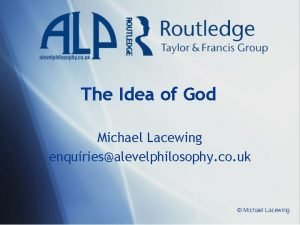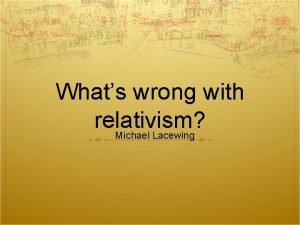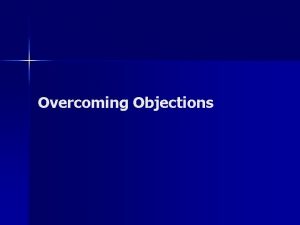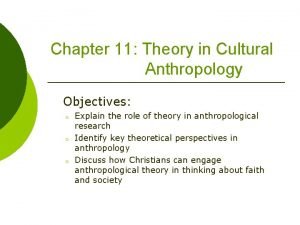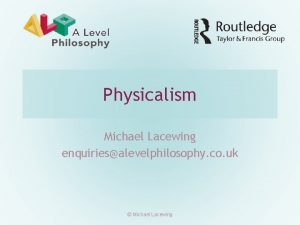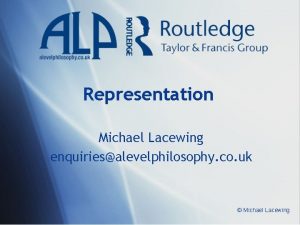Eliminative materialism Michael Lacewing enquiriesalevelphilosophy co uk Elimination














- Slides: 14

Eliminative materialism Michael Lacewing enquiries@alevelphilosophy. co. uk

Elimination v reduction • Eliminative materialism: the way we commonly think and talk about the mind is so mistaken that we should abandon our mental concepts, and talk about brain processes instead. • Reductionism says that there are mental properties, but they are physical properties • Eliminativism says that there are no mental properties

Folk psychology • Churchland: we understand explain each other’s behaviour by referring to beliefs, desires, etc. • Explanations require laws: we use a network of commonsense laws – E. g. if someone is thirsty, they will look for something to drink • This knowledge is ‘folk psychology’ • These laws form an empirical theory about human behaviour

Empirical theories • If empirical theories turn out not to be accurate, then they should be abandoned – If folk psychology is not good at explaining behaviour, we should reject it • Theories hypothesize that certain things exist in order to explain what we observe – E. g. atoms, germs, phlogiston, vital force – If theory is unsuccessful, we shouldn’t think that the hypothesized thing exists • If folk psychology is unsuccessful, we shouldn’t believe that beliefs, desires etc. exist

Reduction or elimination? • Science shows that there is a strong connection between the mind and brain states and processes – Therefore, folk psychology must fit onto neuroscience • Reduction: folk psychology reduces to neuroscience • Elimination: folk psychology will be replaced by neuroscience

Is folk psychology false? • Folk psychology cannot explain much about the mind, e. g. mental illness, intelligence, sleep, perception, learning • Folk psychology has not progressed in 2, 500 years • Folk psychology cannot be made coherent with neuroscience

Intentionality • Mental states are ‘about’, or ‘directed onto’, something, e. g. belief about Paris, desire for chocolate. • Intentionality has nothing to do with intentions. • An Intentional mental state has Intentional content. – ‘What are you thinking? ’

Irreducibility • How could anything physical have intentionality? – Physical states are never ‘about’ anything • So folk psychology can’t be reduced to neuroscience

The intuitive certainty of mental states • Obj: Nothing could be more certain to me than the fact that I have mental states • Reply: but what seems obvious can be false – Does the Sun move around the Earth? – Am I a thinking thing? • Churchland does not deny the existence of psychological phenomena – he denies that folk psychology is the right account of these phenomena – Can we be certain of a theory?

Folk psychology is not false • Folk psychology is meant to explain human action – It is no objection that folk psychology does not explain mental illness etc. • It explains and predicts action very well – Much better than neuroscience! • Folk psychology is the basis of developments in scientific psychology • Reply: all this is superficial, and folk psychological explanations are very weak compared to other areas of science

Self-refuting? • Eliminativism tries to change our beliefs by presenting arguments – Arguments are expressions of beliefs and rely on the meaning of words • Yet it claims there are no beliefs and no meanings! – Any argument for eliminativism refutes itself – its conclusion contradicts its own assumptions

Reply • The objection begs the question – It assumes that folk psychology is the correct account of meaning – Cp: ‘there is no vital force; life is chemistry’ ‘If there is no vital force, you would be dead! The fact that you speak refutes you. ’

Objection • It is a conceptual truth that claims and arguments are ‘about’ something – Eliminativism denies that anything is ‘about’ anything • It is inconceivable that folk psychology is false, since the very idea of ‘being false’ depends on folk psychology being true • Folk psychology is not an empirical theory, but a condition of intelligibility – Therefore, it cannot be eliminated

Implication • If Churchland is right that folk psychology doesn’t reduce to neuroscience, then it is irreducible, not eliminable
 Eliminative materialism
Eliminative materialism Eliminativism
Eliminativism Indivisibility argument for substance dualism
Indivisibility argument for substance dualism Michael lacewing
Michael lacewing Michael lacewing philosophy
Michael lacewing philosophy Michael lacewing
Michael lacewing Descriptive relativism
Descriptive relativism Innate knowledge examples
Innate knowledge examples Michael lacewing
Michael lacewing Lacewing trial
Lacewing trial Gaussian vs gauss jordan
Gaussian vs gauss jordan Anthropological materialism
Anthropological materialism Materialism and greed
Materialism and greed Neomarxism
Neomarxism New historicism vs cultural materialism
New historicism vs cultural materialism



